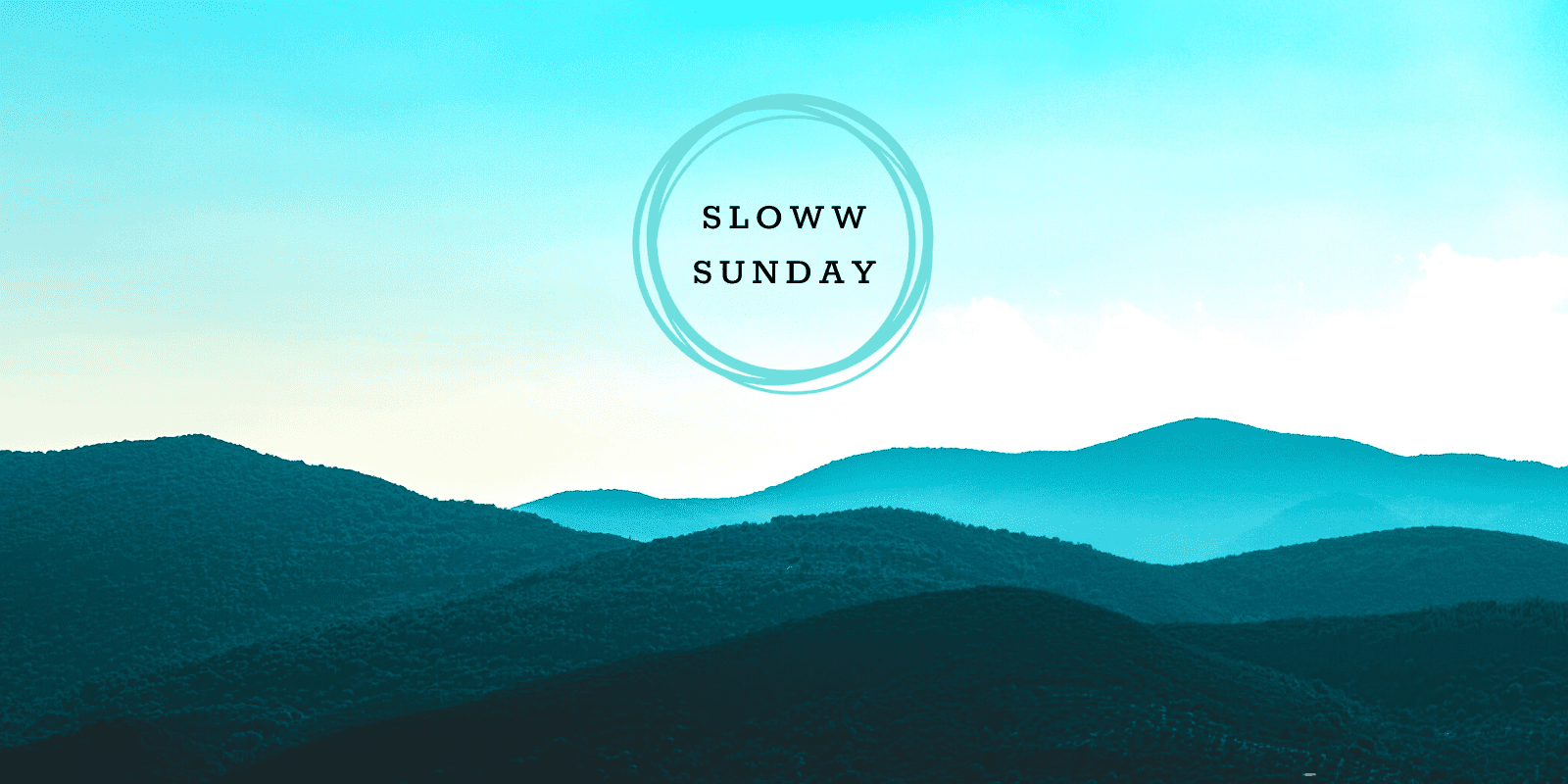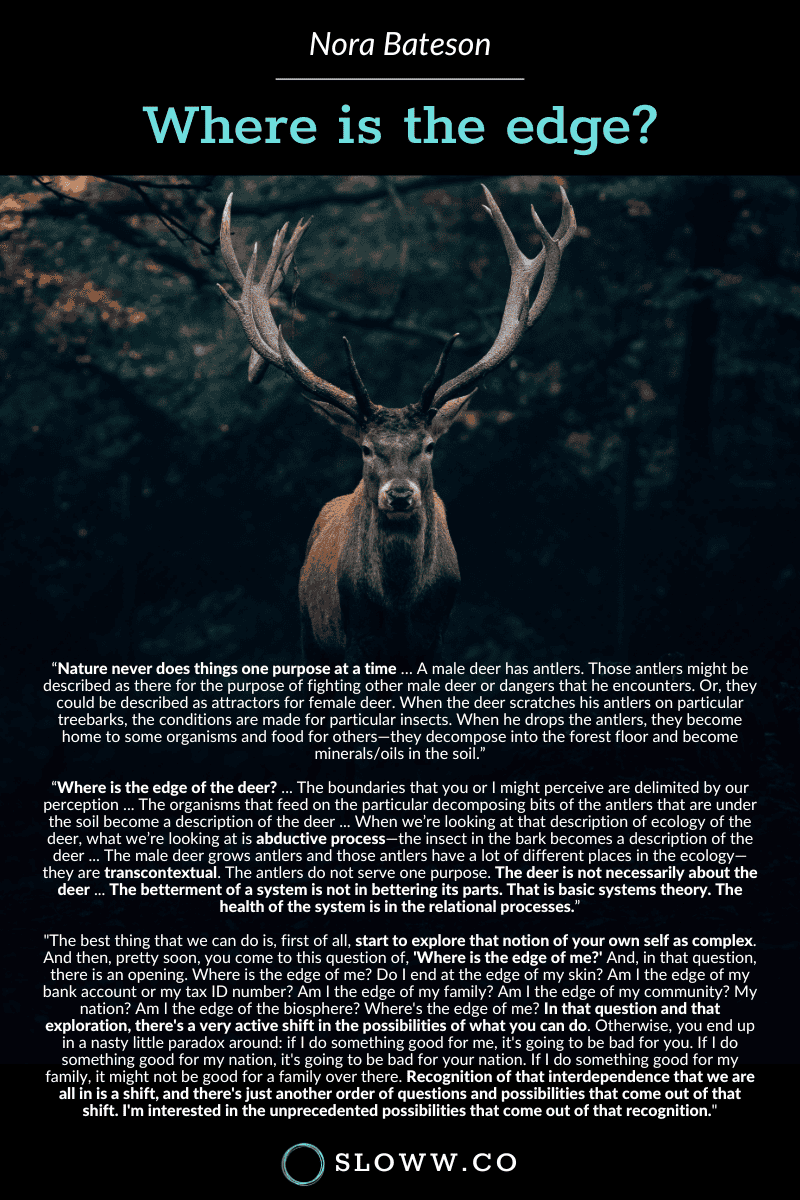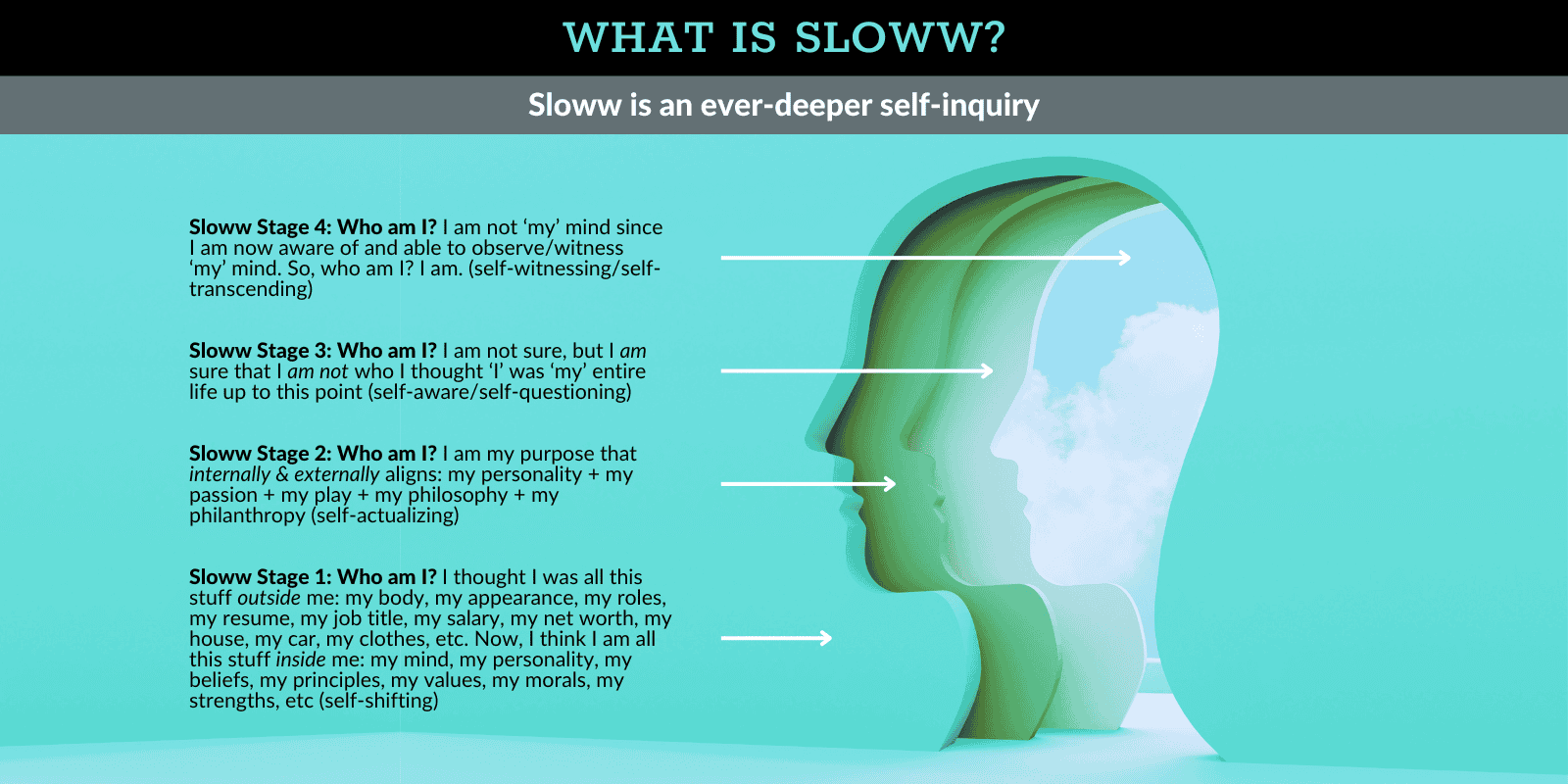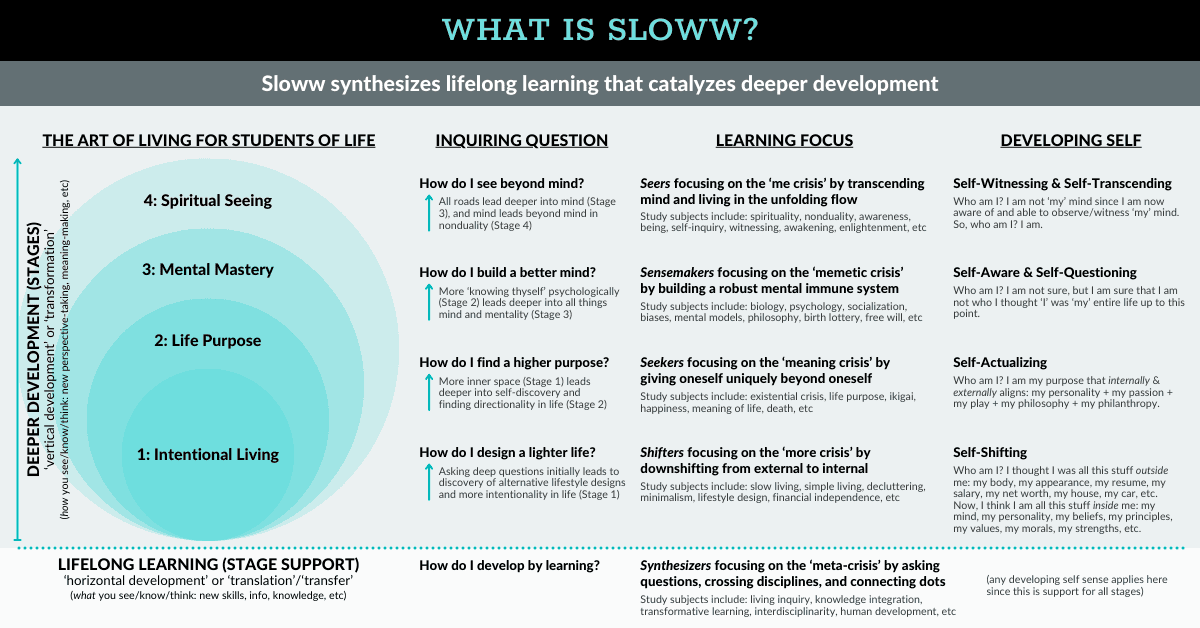Sign up to get the Sloww Sunday newsletter via email for free:👇

Sloww Sunday Newsletter 192 (Jun 23, 2024) — Simple Living, Self-Inquiry, Interdependence, & More
Sloww exists to share the art of living with students of life. The Sloww Sunday newsletter delivers my latest and greatest creations and curations to 10,000+ lifelong learners every week. If you enjoy this issue, please help grow Sloww by forwarding this newsletter to others.
🆕 New News
🎙️ New Podcast Appearance:
I joined Artem Zen on his Elevating Consciousness podcast for a second time. As usual, we had a wide-ranging conversation covering everything from money, to meaning, to the meta-crisis, and more. I’ve also published this guide to all my podcasts (YouTube playlist & Spotify playlist). Enjoy!
🧠 Synthesizer Course Updates:
Just a quick reminder that course pricing will change when 100 students join or by July 1 (whichever comes first). Don’t miss access to free live calls for life ($500 value):
· First 100 students: Course + Community + Calls = $495
· Students #101 & beyond: Course + Community + Calls = $995

Learn more about the course or Join Synthesizer
· Live Call: 25 synthesizers joined the first “Synthesizer Summit.” It was a 2-hour live group call where I presented new info on psychological immunity followed by an open Q&A session about all aspects of the course. The first 100 students (including new students who missed it) get access to the video recording, and the next call will happen in September. Don’t miss free live calls for life!
· Free Lessons: Synthesizer Manifesto (5 mins), The Challenge (4 mins), & The Vision (6 mins).
· Student Feedback: 20+ testimonials (unsolicited) from the early adopters of the course.
· High Value: 50+ courses compared (look where Synthesizer is on the spreadsheet). Many other courses start in the $thousands without delivering this much value.
· Flexible Pricing: Pricing options including payment plans, student discounts/scholarships, and global purchasing power parity for those outside the US. I want everyone who wants to take the course to take the course! Reply to this email if you’re interested in any of these options.
📚 Lifelong Learning & Deeper Development
Development & Relationships
A number of people have reached out to me over the years specifically about relationship struggles due to self-development. The following is what I always share with them from Susanne Cook-Greuter’s ego development theory (Full Paper | Paper Summary).
- “The experience of looking at the world with different eyes than those that used to be one’s closest allies, such as a spouse or a long-term friend, can create great distress for both parties … The move of one partner from conventional to post-conventional meaning-making poses a particular challenge to couples and long-term relationships.”
The person still in conventional stages of development:
- “The conventional partner is confused about the new way of behaving of the person with the 4th person perspective … The person ‘left behind’ can feel disrespected and misunderstood.”
The person now in post-conventional stages of development:
- “Those who are post-conventional feel misunderstood and unappreciated for what they now feel they have to offer. They also often wish for the significant other to become more like themselves … Unlike later stages, early post-conventional individuals cannot yet fully appreciate the gifts of the earlier levels. They genuinely feel that if only others—including their loved ones—would become more like themselves, then everybody would be happier and the whole world would be better place.”
🔒 Sloww Premium deep dive:
- What is the Subject-Object Relationship?
- My Ego Development Theory Self-Assessment
- How my Personal Development Journey maps to Ego Development Theory (Sloww Stages vs EDT Stages)
Explore more: 50+ posts on Lifelong Learning & Deeper Development (Sloww Stage Support)
🌎 Lighter Living
Simple Guide to Voluntary Simplicity
If you are getting started with intentional living in general—or simple living in particular—check out the concept of “voluntary simplicity”:
1. “Voluntary Simplicity” by Duane Elgin (Book Summary)
- “To live more voluntarily is to live more deliberately, intentionally, and purposefully—in short, it is to live more consciously … To live more simply is to live in harmony with the vast ecology of all life. It is to live with balance—taking no more than we require and, at the same time, giving fully of ourselves … Voluntary simplicity is a way of living that is outwardly simple and inwardly rich. It is a way of being in which our most authentic and alive self is brought into direct and conscious contact with living.” — Duane Elgin
2. “The Value of Voluntary Simplicity” by Richard Gregg (Essay Summary)
- “Voluntary simplicity involves both inner and outer condition. It means singleness of purpose, sincerity and honesty within, as well as avoidance of exterior clutter, of many possessions irrelevant to the chief purpose of life.” — Richard Gregg
3. Voluntary Simplicity: “Listening to the Quiet Revolution” by Katie Barton (Thesis Summary)
- “Duane Elgin popularized the term ‘voluntary simplicity,’—which pacifist Richard Gregg had coined in 1936—as a characterization of the modern simplicity movement. To live voluntarily, Elgin explains, is to live conscientiously and deliberately, and to live more simply is to unencumber oneself in all aspects of life in order to ‘(meet) life face to face.’ In short, voluntary simplicity is ‘outwardly more simple and inwardly more rich.'” — Katie Barton
🔒 Sloww Premium deep dive:
- Behind the Scenes: A Look at My Personal Lifestyle Design
- Behind the Scenes: My Evolving Relationship toward the “Money Middle Way”
Explore more: 100+ posts on Intentional Living (Sloww Stage 1)
🧭 Higher Purpose
The Hero’s Journey is a Myth (Literally)
Most people have heard of the “hero’s journey” via Joseph Campbell—you know, the image above.
I was big on the hero’s journey when I first discovered it and started to apply my own journey to that story/narrative context. Campbell’s books The Power of Myth and The Hero with a Thousand Faces are still on my reading list. I even published this post years ago: 🔒Is Life a Sine Wave of Repeated Hero’s Journeys?
But, these days I realize I wasn’t going deep enough. I thank Nora Bateson (who also has two books on my reading list) for helping me see that the hero’s journey is a myth (literally)—it’s much more the story of the town/village that shaped the hero in the first place. Bateson reminds us that we can’t pluck individual heroes out of the interdependent context and countless factors that created and shaped them:
- “In the past the world understood leadership as the great deeds of heroes; now we are in another phase of global transition that requires an understanding of leadership based on our understanding of interdependency. Is there a part of any of us that we can point to and truly say, ‘that is me—untouched or influenced by any of my history, my culture, education, family, religion, social life…’? Unlikely. Perhaps, instead, leadership is a product of the context, combined with other influences that seem to culminate in crowning an individual with leadership duties. When we look through the lens of interdependency, it is impossible to separate individuals from their contexts of influence and experience. This blurs the ‘hero’s story.’ Leadership, then, can better be attributed to the town or village that nourished a person than to that person’s individual qualities.”
- “In ecological terms we can attribute the health and vitality of the whale to the ocean not only to the whale, and we can attribute the strength of the lion to the jungle (or savannah) not only to the lion. The environment in which the alchemy of collective need is met with a corresponding alchemical combination of possibility produces new paths to follow. In the combination of community and individual, hardship and support, isolation and belonging, past and future, vision and discipline, there can arise a perfect storm that produces what we have, in the past, called leaders.”
- “Our fatal flaw may be the idea that an individual or institution can single-handedly penetrate new frontiers of possibility. This is an obsolete but undead dream of heroes and rescuers pioneering innovations. Lightning bolts of imagination and strength, these so-called leaders are presented as utterly independent of their histories; as though they had fallen from the sky. The haunting seeps into what we call ambition, fueled by our wanting to be important and successful. There are scissors somewhere that slice the ambitious from their comprehension of the mutuality we all inevitably live within. The mutuality is where the imagination is brewing, where the strength is made, where the integrity of the context lies. Can we extract a stand-out entity from that mutuality and call it a break-away? Isn’t the break-away a product of the mutuality? How can ‘leaders’ exist without all the relationships that have culminated and fermented to make them? Should we not point to those mutualities as heroic?“
🔒 Sloww Premium deep dive:
- Nora Bateson Synthesis: Is Developmental Stage Theory BS?
- What’s our Problem with (Mis)Attribution of Agency?
Explore more: 50+ posts on Life Purpose (Sloww Stage 2)
🧠 Mental Mastery
Everything affects Everything
Everything matters—literally every thing—including the seemingly smallest, most insignificant things. It seems completely clear to me that life is one incomprehensibly interconnected “thing,” and there’s no such thing as separate anythings.
Alan Watts (Top Quotes | 🔒Premium Synthesis) was someone who seemed to understand this more than most:
- “Let’s take the bees and the flowers. In a world of no bees there’s no flowers; in a world of no flowers—no bees. Because bees and flowers are aspects of the same organism, or organization. They go together, so I invent the word ‘goeswith’ to indicate organic relationships. And we as human beings, obviously, we ‘gowith’ an enormous cosmos of geological, botanical, and zoological events. And we are entirely dependent on them, and we cannot treat them as really and truly separate species … What we’ve got is a universe that all hangs together, and where each so-called part of it implies all the other parts … There is really and truly no way of separating out independent things.” — Alan Watts
The following is minimally paraphrased from Alan Watts:
- However much we divide, count, sort, or classify into particular things and events, this is no more than a way of thinking about the world: it is never actually divided. A basic problem we’ve got to go through first is to understand that there are no such things as things—that is to say, separate things or separate events … No one thing or feature of this universe is separable from the whole. The individual and the universe are inseparable. Human nature and ‘outside’ nature are all of a piece … Every individual is a unique manifestation of the Whole, as every branch is a particular outreaching of the tree. To manifest individuality, every branch must have a sensitive connection with the tree, just as our independently moving and differentiated fingers must have a sensitive connection with the whole body. The point, which can hardly be repeated too often, is that differentiation is not separation. The head and the feet are different, but not separate, and though man is not connected to the universe by exactly the same physical relation as branch to tree or feet to head, he is nonetheless connected—and by physical relations of fascinating complexity.
Another person who gets this is, once again, Nora Bateson (🔒Premium Synthesis):

🔒 Sloww Premium deep dive:
- Alan Watts Synthesis: How to Answer the Ultimate Question of “Who am I?”
- Nora Bateson Synthesis: Is Developmental Stage Theory BS?
Explore more: 75+ posts on Mental Mastery (Sloww Stage 3)
☯️ Spiritual Seeing
Ever-Deeper Self-Inquiry
There is no difference between spirituality and life—spirituality and life are one and the same. This is why life itself—the art of living—is the ultimate spiritual practice. The living is the practice field and playing field simultaneously.
Spirituality is simply seeing who you are beyond mind/self in your direct experience. Just keep asking, “Who am I?” This questioning will lead to learning which will lead to developing. And, this developing will lead to ever-deeper questioning—meaning how you answer “Who am I?” will develop:

This developing sense of self is also the last column in the graphic below which essentially sums up Sloww in a nutshell. Sloww is a synthesis on the art of living for students of life. My purpose is synthesizing lifelong learning that catalyzes deeper development. All of the learning is in service of the living.

🔒 Sloww Premium deep dive:
- Alan Watts Synthesis: How to Answer the Ultimate Question of “Who am I?”
- How to Practice Self-Enquiry with “Be As You Are” by Ramana Maharshi (+ Infographic)
- What is Witness Consciousness?
Explore more: 75+ posts on Spiritual Seeing (Sloww Stage 4)
💬 Wise Words
Before you get upset or angry with someone, remind yourself of these words from Alan Watts (Top Quotes | 🔒Premium Synthesis)—most people are still playing a really far out game:
- “When you see the people who you think are not in on the secret—if you really understand—you have to revise your opinion completely and say that the squares are the people who are really far out because they don’t even know where they started. See, an enlightened Hindu or Buddhist looks at the ignorant people of this world and says, ‘My respects. Because here I see the divine essence having altogether forgotten what it is and playing the most far out game of being completely lost. Congratulations! How far out can you get?’ So, if you understand that, you don’t start a war with people you might say are square. Don’t challenge them, don’t bug them, don’t frighten them. The reason is not because they are immature—because they are babies and you mustn’t scare babies—it’s nothing to do with that. You mustn’t frighten them because they are doing a very far out act. They’re walking on a tightrope, miles up, and they’ve got to do that balancing act. And, if you shout, they may lose their nerve. See? That’s what we call the ‘responsible people of the world’ are doing: it is an act; it’s a game just like the tightrope walker. But, it’s a risky one, and you can get ulcers from it and all sorts of troubles. But, you must respect it and say, ‘Congratulations on being so far out.'” — Alan Watts
Share: Sloww Sunday currently sends to 10,000+ students of life each week. If you enjoyed this issue, please help grow Sloww by forwarding this newsletter to some friends and family. It’s free for them to subscribe here.
Support: Sloww is a one-human labor of love (it’s just me over here 👋). Your support keeps the site ad-free and invests in me while you invest in yourself—a true win-win! There are free and financial ways to support.
Speak: Have something you want to say, or just want to say hi? It’s always greatly appreciated. Just leave a comment or reach out socially.
All the best,
Kyle Kowalski
Founder, Sloww





Leave a Reply